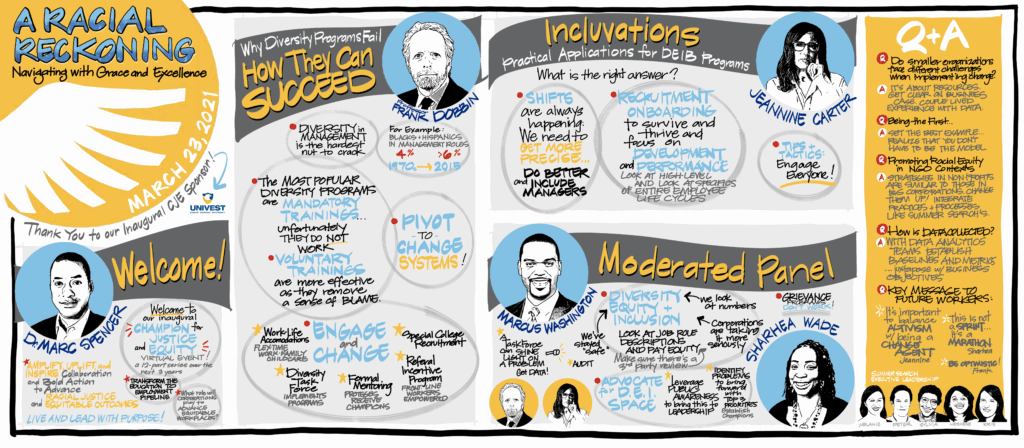April 8, 2021
CJE: Building Racial Equity in Corporate America
Share
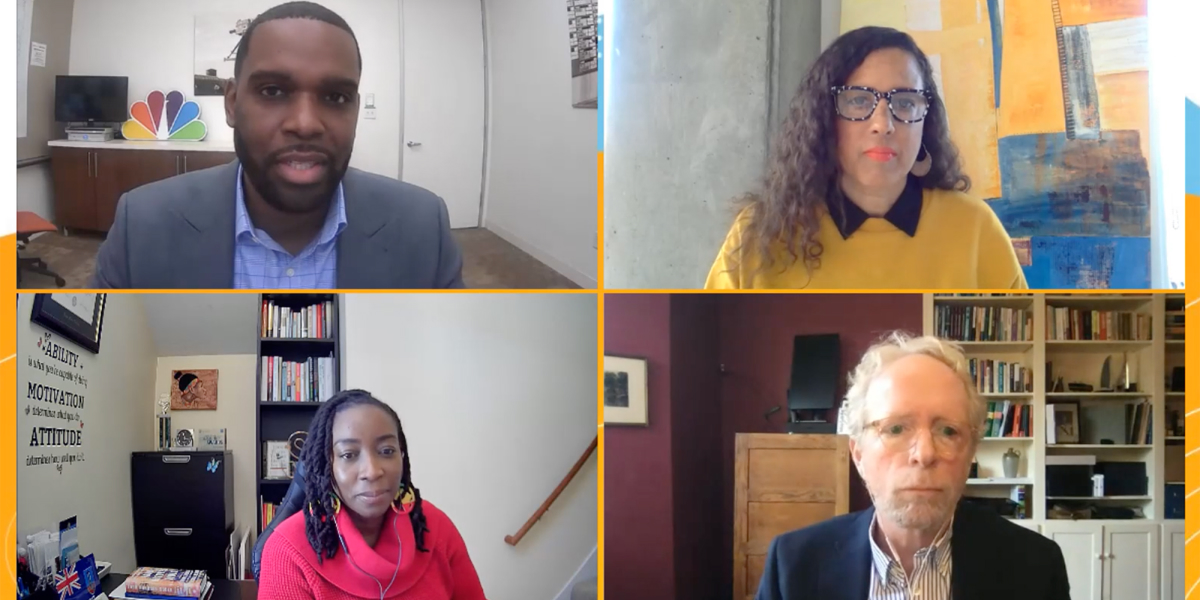
Summer Search kicked off our Championing for Justice and Equity (CJE) series last month with a conversation about corporate America’s role in advancing racial equity.
Whether your company uses the term EDI, DEI, or I&D, we are all talking about the same things: Equity, Diversity, and Inclusion. As an organization, Summer Search is committed to creating a space to discuss the ways we can achieve justice and equity for our students and our community.
In this first CJE event — A Racial Reckoning: Navigating with Grace and Excellence — our panel of experts in the academic world, Corporate America, and the Summer Search community, discussed a variety of EDI policies and practices, analyzing what works and what doesn’t.
As Jeannine Carter, Founder and Chief Innovator at Incluvations, said in her remarks, “We need to value the differences.” A diverse workforce makes any corporation stronger and gets us closer to racial equity for all.
We invite you to watch the full conversation and read the recommendations and resources below. Stay tuned for more about our next two events, Racially Speaking: The Future of Work (June) and Closing the Education Equity Gap (September).
Conversation Contents
- 0:28 – 4:03: Introduction – Dr. Marc Spencer, Summer Search CEO.
- 4:04 – 22:32: Why Diversity Programs Fail & How They Can Succeed – Professor Frank Dobbin.
- 22:33 – 32:30: Keynote – Jeannine Carter.
- 32:33 – 58:40: Panel Q&A – Marcus Washington, Sharhea Wade, Jeannine Carter, and Frank Dobbin.
- 58:41 – 1:01:13: Closing.
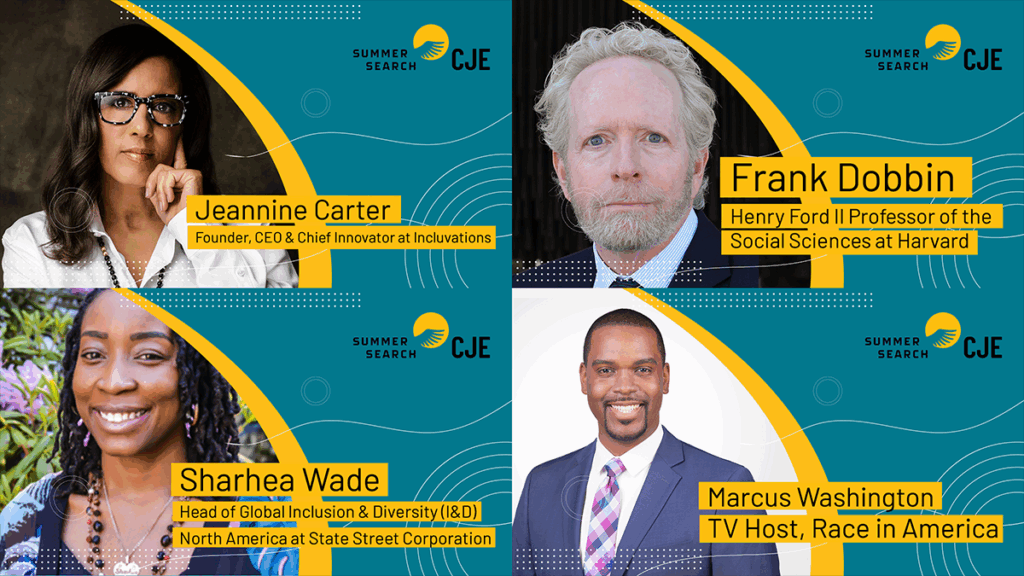
Our Guest Speakers
- Jeannine Carter – Founder, CEO & Chief Innovator at Incluvations. Summer Search Board Member.
- Frank Dobbin – Henry Ford II Professor of the Social Sciences at Harvard University.
- Sharhea Wade – Head of Global Inclusion & Diversity North America at State Street Corporation. Summer Search Boston Alumna.
- Marcus Washington – Emmy® award-winning Morning and Midday Anchor, NBC Bay Area.
Why Diversity Programs Fail & How They Can Succeed
Professor Frank Dobbin shared insights from his evidence-based research on corporate diversity programs (with Alexandra Kalev) — Why Diversity Programs Fail & How They Can Succeed. Dobbin and Kalev analyzed data from 829 firms over three decades and uncovered numerous diversity tactics that move the needle in the workplace.
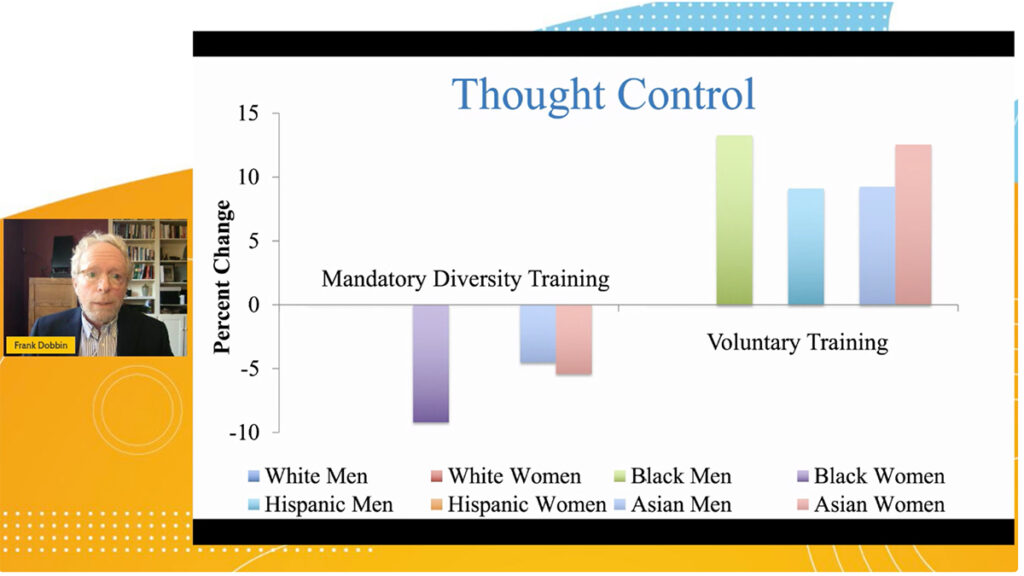
Professor Frank Dobbin's analysis of mandatory vs. volunteer diversity training programs.
What’s Not Working
- Women and minorities have not gained much ground in management over the past 20 years.
- Organizations are trying to reduce bias with the same kinds of programs they’ve been using since the 1960s — mandatory diversity training, hiring tests, performance ratings, grievance systems — tend to make things worse, not better.
- These tools actually decrease the proportion of women and minorities in management. They’re designed to preempt lawsuits by policing managers’ decisions and actions. But as studies show, this kind of force-feeding can activate bias and encourage rebellion.
What Does Work
- The most effective programs spark engagement, increase contact among different groups, and promote social accountability, drawing on people’s strong design to look good to others.
- Frame efforts more positively, forgo the “mandatory” control tactics.
- Recruiting initiatives, mentoring programs, and diversity task forces.
- Emphasize a culture of work-life balance.
Read Professor Frank Dobbin’s full analysis here, via Harvard Business Review >>
Keynote
Jeannine Carter reflected on her 20+ years of experience in the global Diversity and Inclusion field, from having assisted many Fortune 500 companies, small organizations, and institutions in achieving their goals.
She first acknowledged that many companies and individuals are at different points on the DEI spectrum, from wondering how to get equity and belonging work started, to looking for ways to break through barriers to keep advancing this work.
Carter also offered some additional context to Frank Dobbin’s data, explaining the progression of DEI terminology over the years. “We’ve gone from mono-culturalism, to multiculturalism, to then diversity and inclusion, to now the need to focus on anti-racism,” she explains. “A lot of folks are trying to figure out what is the right answer.”
Overall, Carter discussed several ways to “double click multiple times to get to the root problem” within a company. Some highlights:
- “We need to value differences.” There is a business case to valuing those differences within employees.
- Managers must be included, not just senior leadership. Managers have the most direct impact on their employees.
- Look at the entire employee lifecycle – recruitment, onboarding, career development, performance management – and make sure it is consistent, with clear goals and definitions of success.
- Apply financial and human resources to this work. Without infrastructure, it won’t go anywhere.
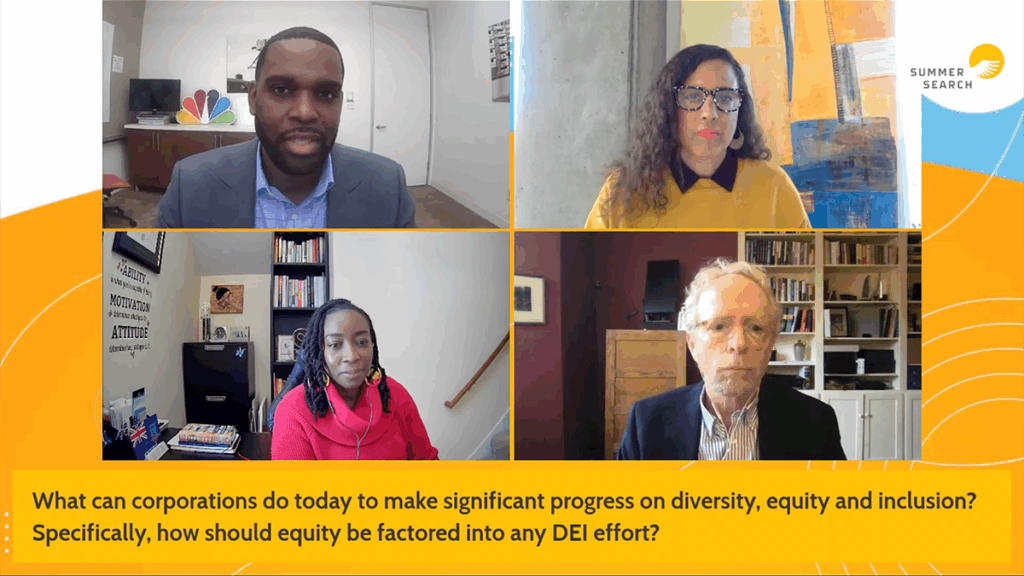
Panel Q&A Breakdown
Question: What can corporations do today to make progress on diversity, equity, and inclusion (DEI)?
(From 33:32 – 38:05)
Sharhea Wade: “The conversation has shifted. Now, we’re looking at our job and role descriptions a little bit closer. How are we auditing the systems currently in place? Is there a problem with pay equity? We’re now at the point where corporations are taking it more seriously.”
Q: What advice would you give for how to advocate for DEI policy, practices, and norms with leadership and colleagues?
(38:10 – 47:16)
Jeannine Carter: “Put together a task force of people to identify what some of the problems are. Devise some of the solutions that you would like to bring forward. Try to make that easy for (leadership) to digest. And then have your top three priorities.”
Frank Dobbin: “Put the data out there so that no one can say ‘we don’t have a problem.'”
Q: Do smaller companies face different challenges than larger ones when implementing change?
(47:17 – 49:37)
Jeannine Carter: “Larger organizations can tap into multiple resources. There’s usually a data analytics team, a recruiting function… A lot of this work is done through influence of these other functions. That can be the struggle for smaller corporations. But this isn’t just about the business anymore, it’s a human issue.”
Q: How do you suggest engaging companies that refuse to implement/address DEI efforts?
(49:39 – 53:25)
Sharhea Wade: “If your company is not addressing the values of their employees, it’s time for you to go… Black and Brown people are no longer a minority in this global context — they are going to be your customers and your employees.”
Q: As someone who works in an NGO, could you speak to promoting racial equity?
(53:27 – 55:37)
Frank Dobbin: “Every place has a hiring system, onboarding system, training system, mentoring system. For most places, they were oriented many years ago to white men… People need to look at those systems and change them up. The same changes that work for corporations, have been working quite well for NGOs.”
Jeannine Carter: “I think Summer Search is a great model. They’ve really found a way to integrate some of the practices and processes into the fabric of Summer Search.”
Q: What messages would you leave our future workers as they enter their careers?
(55:45 – 58:40)
Jeannine Carter: “Don’t lose the activism part of you. That is the part that is going to help us disrupt the systems that have created the situation where we are. Please incorporate that into your journey.”
Sharhea Wade: “This is not a sprint; this is a marathon.”
We couldn’t have said it better, Sharhea. Achieving racial equity in the workplace will take time, but as long as companies and organizations are putting in the work, Summer Search will be running alongside them through our CJE series.
